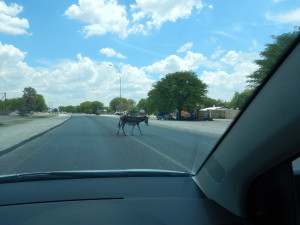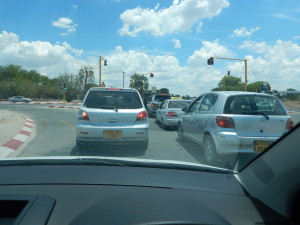
One of my many tasks shortly after arrival in Maun was to buy a car. This is tremendously daunting. First of all, I’ve only bought one car in my life – that was almost two decades ago, and I bought it brand new. Second, I am not the right person to assess the mechanical status of a used car. I can drive it around the block and check for dents and dings. Beyond that, I’m anybody’s sucker, vulnerable to being taking for the kind of financial ride that nobody wants.
So, naturally, I started asking around about used cars. The manager of the hotel we stayed at introduced me to a car dealer acquaintance of hers who immediately offered me a 1998 Toyota Hilux at twice the market value (thanks Internet). As an aside, my husband noted that Toyota Hilux is the #1 vehicle-of-choice for terrorists around the world.
That really added to the good feeling of the overpriced Hilux.
Toyota 4x4s are the favorite vehicles in Maun. You need a 4×4. There are tar roads here – several in fact. But almost everyone’s house, including mine, is off the tar road, down some rutted sand track of variable distance that gets muddy when it rains (if it rains). Besides, you don’t come to Africa to drive on tar. All the cool stuff is at the end of a dirt road – and that dirt road is not 2-wheel drive friendly.

Toyotas are also favored because you can get Toyota spare parts more easily than those of other makers. Or at least, this is what people tell me. So I bought a Nissan.
Don’t get me wrong – I like Toyota with its apparently easy-to-get spare parts. But the availability of used cars in a place like Maun is thin to say the least. There are two dealers in Maun – Toyota and Nissan. Neither keeps a steady stock of used cars on their property. If you want a used car, they can show you pictures of it and bring it up from Francistown or Gaborone after you buy it. They tend to stock very gently used cars, accompanied by very gently reduced prices compared with new. Bottom line – the dealers were too expensive for me and my short-term 7-month stay in Botswana.
There are lots of smaller local dealers – the proverbial “used car sales people”. The overpriced Hilux was associated with one of those and I was wary.
I ended up buying a car from another parent at my children’s school. Just one of those things. I’ve had the car for 10 days, and so far only one trip to the mechanic after the check engine light came on. The car seems to be fine and I chalk up the visit to the mechanic as “getting to know my car”. I also now have a mechanic who came highly recommended to me. That generally makes me feel better about owning a used car in Botswana.
So, what are the nuts and bolts of car ownership in Botswana? And what I mean is – what paperwork is involved?
Car ownership is transferred using a “blue book”, equivalent to the Title in the U.S. The “blue book” is in fact a single piece of paper (nothing bookish about it) with a red, white, and green watermark (nothing blue about it). The buyer and seller each complete their sections of the blue book and then someone (hopefully not you) has to stand in line ALL DAY at the transport office to pay 130 pula (US $13) to transfer ownership. The person who sold me his car persuaded a member of his staff to stand in line for us. So I was lucky enough to avoid the standing in line part on this occasion (although other chances for line standing abound). Once that task is done, the car is yours.
The only other part is the car license, renewable once per year and transferable to a new owner. The license allows a car to be driven on the road. It’s like the annual car registration fee in the U.S. and similarly comes with a sticker that you attach to your car. My license expires at the end of February, giving me a month to renew and a new line to look forward to. Luckily, my mechanic mentioned that you can renew car licenses at the post office in the airport (if their network is up), which rarely has any lines. I went along to the airport post office, and miraculously their network was up (unlike the immigration office) and he processed my renewal in three minutes. It was wonderful.
I suggested to the guy at the post office, who is very helpful by the way, that he should start handling residency visa applications as well. He laughed and said, “maybe, one day”.
I almost forgot – there is also the issue of insurance. I bought my insurance from the Botswana Insurance Company, located across from the airport in Maun. It was a simple matter of me filling out a short form and giving them money and them writing a policy. Interestingly there was no credit check and no verification of my driving record that I could tell – though they did want to see my Tennessee driver’s license. They send all the info to their main office in Gaborone and I supposedly should be able to pick up my policy this week. I was covered from the day I enrolled with them, or so the agent assured me.
Hopefully the policy is as I expect.